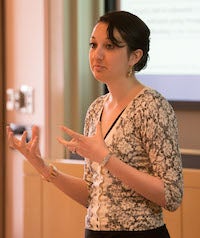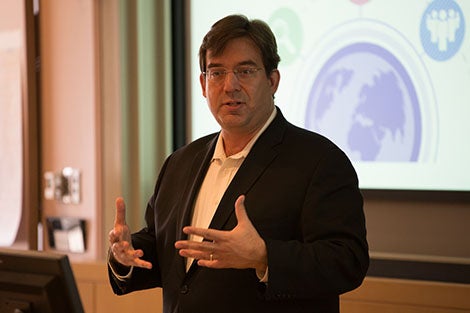May 5, 2015 — Over the past several years, crowdfunding websites like Kickstarter, Indiegogo and Kiva have helped people all over the world raise money for a host of activities—artistic endeavors, tech startups, community or personal projects, charities, and more. Now there are plans for a crowdfunding site focused on raising money specifically for global public health projects—things like stocking a rural health clinic or providing a water filtration system for a small village.
The new platform will be launched soon by Janssen, the pharmaceutical company of Johnson & Johnson. Students and faculty at Harvard T.H. Chan School of Public Health got an overview about how the platform will work on April 30, 2015 in Kresge 502 from Derek Fetzer, a director of global public health at Janssen; and Harvard graduate Sara Gorman, PhD ’13 (English literature), who works as a consultant for Janssen and is an MPH candidate at Columbia University Mailman School of Public Health. Gorman has also worked as a research assistant for Michelle Williams, chair of Harvard Chan’s Department of Epidemiology, who introduced the two speakers.
The crowdfunding site will work very simply. People affiliated with nonprofits will post their proposed global health projects on the site free of charge. Each project will be vetted by a panel of academics to ensure that it’s a bona fide public health project—that each “has a population impact, and that it’s a true priority,” Fetzer said. Potential donors will be able to browse the various proposals and choose whatever public health priorities appeal to them. And donors will be able to track the progress of the projects they fund and to communicate directly with project owners.

Gorman pointed out that the crowdfunding phenomenon is growing rapidly, with much of it aimed at benefiting social causes. “While we think about trying to get money for things like charitable causes and global causes from corporations and government entities, individuals are a huge source that are often overlooked,” she said. “There’s a lot of potential to tap into this ‘crowd’ of individuals to get money for things like global health projects—and that’s where crowdfunding comes in.”
photos: Noah Leavitt
